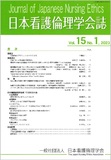Japanese
English
- 販売していません
- Abstract 文献概要
- 参考文献 Reference
- サイト内被引用 Cited by
目的:倫理審査を受けた看護学研究者の倫理審査に対する評価とその特性との関連及び望ましいあり方を明らかにする。
方法:全国の看護系大学90校の看護学研究者900名に質問紙調査を実施した。個人属性、組織変数のほか、倫理審査の評価18項目、望ましいあり方11項目について5段階で回答を求めた。重回帰分析により尺度としての妥当性を確認し、特性との関連を検討した。
結果・考察:審査結果が妥当だった等の肯定的評価の一方、手続きの大変さも感じていた。審査の肯定的評価には、審査基準の公表や結果を1カ月以内に出すこと、審査へのサポート体制があることなどが関連していた。また、科学的妥当性への言及や同意取得の手続き等について、研究者の理解不足も示唆されたが、委員になるための研修制度や資格が整備されることを望んでいた。
結論:看護学研究者に対する研修だけではなく、倫理審査に対する組織の取組みの改善が重要である。
Aim: To evaluate the opinions of nursing researchers on the ethical review process and relationships between their evaluations and personal and institutional variables, as well as the ideal form of the ethical review process.
Methods: A questionnaire developed for this study was distributed to 900 nursing researchers in 90 nursing universities. Participants were required to evaluate on a 5-point Likert scale 18 items regarding the ethical review process they underwent, and 11 items asking about the ideal form of the ethical review process. Demographic and institutional data were also obtained. Multiple linear regression analysis was used to examine the relationship between answers to the questionnaire and assessed variables.
Results and discussion: Participants considered the review results to be valid, viewed the review process positively, although they considered it to be highly demanding. Positive evaluations were related to the disclosure of review criteria, notification of review results within a month, and available support system. The results also suggested that nursing researchers should understand more about being reviewed scientifically, and informed consent, and ethical review members need to be trained and entitled.
Conclusion: Improving the ethics review system is important, as is providing relevant training on this topic to nursing researchers.
Copyright © 2023, The Japan Nursing Ethics Associatin. All rights reserved.


